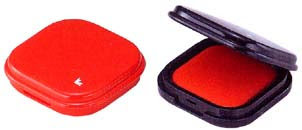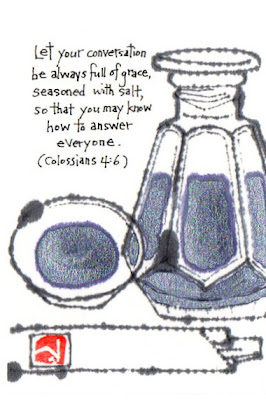Monday, May 28, 2012
Thursday, May 24, 2012
rubber chop maintenance
 |
| use "shuniku" stamp pads for your rubber hanko |
First of all, you have to understand that rubber hanko are consumables. They do not last forever. To make them last as long as possible, however, you need to follow these rules:
 |
| ink paste is no-no for rubber chops |
2) Do NOT use red ink paste to ink your rubber hanko. This is safe for chops carved from stone or wood, but not for rubber chops. The oils in the paste will cause your rubber hanko to get hard and brittle over time. The paste also contains particles that will stick in the grooves of your rubber hanko, and unlike the sturdier stone and wood chops, if you try to scrape such particles out of the grooves, you can easily nick your rubber chop and ruin it.
Get yourself a shuniku stamp pad. They are cheap and have the same bright red-orange color that is traditional for using with chops. These pocket-sized stamp pads (or ink pads) are typically encased in round plastic cases with screw caps, or square plastic cases with flip-tops like in the photo at the top of this post.
If this post is unclear in any way, let me know so I can fix it.
Here's a link to the post where I explain about making your own rubber hanko
Tuesday, May 22, 2012
etegami supplies and an etegami call
(1) I will be restocking etegami supplies on my Etsy shop one last time this year. Click here for the list of main items. If there is something special you want me to look for that isn't in the listing, I can give it a try. Message me on Etsy to pre-order your items, then I will set up a custom listing for you to make the purchase. Your shipping cost will depend on the total weight of the items you order. I will figure it out for you before I set up your custom listing. All transactions must be completed before May 30. I will order from the supplier on June 1, package your items for you when they reach me, and then ship them to you by air mail. Your order should reach you in 2~3 weeks after the transaction.
(2) A British etegami artist friend of mine is calling for etegami on the theme of "England or Englishness." Deadline is June 26. Here is the original announcement:
ETEGAMI CALL! Please submit your etegami on the theme of England or Englishness to help celebrate us hosting the Olympic games and our Queen's Diamond jubilee-60 years on the throne. Please submit to Dan Jones, 15 Aspen Way, Newport, Shropshire TF 107EE, UK. Deadline is 26th June. I'm going to try and get some gallery space in Shrewsbury, if not I will create a Blog to exhibit them.
Saturday, May 19, 2012
the four scariest things in life
Here's another daruma doll etegami for you from my Father's Day series. The hand-made card, made from recycled papers, is stiff and bumpy, and repels the inks and colors I usually use for etegami. So I drew the simple image and the words with a black permanent marker.
The writing quotes an old Japanese expression: Jishin, Kaminari, Kaji, Oyaji (Earthquake, Lightning, Fire, and Dad), a list of four of the most terrifying things in life. I first heard it as a child when it was used as the title of a TV drama featuring a fiercely despotic father. Very recently, I was rooting through some linguistic archives on the internet, and I discovered that the word oyaji, as used in this particular expression, is not the word oyaji that means "Dad," but is rather a mutated form of Oo-yama-ji (big-mountain-storm), which used to be another word for Typhoon! I asked my Japanese friends if they were aware of the original meaning of this once-common expression, and even the oldest among them had never doubted the oyaji = dad interpretation. Probably because they all grew up in an age when "Dad" really did belong on a list of life's most terrifying things.
For those who haven't been following my blog long enough to understand what the daruma dolls represent, or why I find them fascinating, you can catch up a bit by reading one of my earliest Daruma posts. (click here)
The writing quotes an old Japanese expression: Jishin, Kaminari, Kaji, Oyaji (Earthquake, Lightning, Fire, and Dad), a list of four of the most terrifying things in life. I first heard it as a child when it was used as the title of a TV drama featuring a fiercely despotic father. Very recently, I was rooting through some linguistic archives on the internet, and I discovered that the word oyaji, as used in this particular expression, is not the word oyaji that means "Dad," but is rather a mutated form of Oo-yama-ji (big-mountain-storm), which used to be another word for Typhoon! I asked my Japanese friends if they were aware of the original meaning of this once-common expression, and even the oldest among them had never doubted the oyaji = dad interpretation. Probably because they all grew up in an age when "Dad" really did belong on a list of life's most terrifying things.
For those who haven't been following my blog long enough to understand what the daruma dolls represent, or why I find them fascinating, you can catch up a bit by reading one of my earliest Daruma posts. (click here)
illustration friday (sight)
There was a time, not very long ago, when Japan's hard-working lower and middle classes loved to quote, and certainly believed in, the expression kodomo wa chichioya no senaka o mite sodatsu (a child grows into adulthood by watching his/her father's back). The idea is that a child learns a great deal about life, responsibility, honor, and well...basically all the virtues of responsible adulthood, from watching the back of his/her father, even if they rarely spend time with him face to face. Watching the back of a father who lacked those virtues is also, for better or for worse, an education.
I myself grew up in the days up to and including Japan's phenomenal economic growth of the mid-to-late 1900s. My friends rarely saw their fathers, who worked from early to late each day, and "weekend" was only a vague, foreign concept. But, both literally and figuratively, the children watched their fathers' backs, and from these backs they learned many of life's lessons.
Young parents of 21st century Japan, for the most part, believe in fathers being more actively involved in raising the kids, and (partly as a result of the burst of the economic bubble) the workplace is no longer the center of their lives. The above-mentioned expression continues to be quoted, however, as a reminder that the children are always watching... and learning.
Sunday, May 13, 2012
illustration friday (kernel)
I've often thought that corn-on-the-cob looks like a wide mouth full of teeth. Surely I'm not the only one?
Thursday, May 10, 2012
where the wild things are
This is my tribute to Maurice Sendak (June 10, 1928 – May 8, 2012), author and illustrator extraordinaire. Thank you, Maurice, for helping to awaken my love for language, and for inspiring so many delightful daydreams. All the wild plants in this recipe are found growing freely in my small, wildly neglected, and wildly alive backyard. To see my gallery of illustrated recipes, click here.
Wednesday, May 9, 2012
bookplates and disaster relief updates
I am waaay overdue to post an update on two topics for which you, my dear readers, have given your invaluable input. The first pertains to the etegami bookplates. I was pleased to receive some great feedback from the winners of the bookplate giveaway. All the feedback was encouraging and supportive, and many suggested thoughtful improvements. That got my creative juices flowing, and I began devising all sorts of variations on my original bookplate designs. Then, inevitably, I became distracted by other enthusiasms (I have so many, I don't know what to do with myself!). So, I regret to say that the bookplates are not nearly ready to be listed on my Etsy shop. They will percolate a while longer in my brain, if you don't mind. :)
Now, the second, and more important topic, is the "We Are Connected" flying carp t-shirt I designed to raise funds to help the victims of the March 11, 2011 Japan Earthquake/Tsunami disaster get back on their feet. In your country, the media may have stopped reporting on the disaster, but we are still a long way (probably decades away) from recovery. After learning that my original choice of disaster relief organizations was no longer functioning, I submitted the first year's sales proceeds to the Japan Red Cross. Sales of the t-shirt have picked up a bit recently for some reason, so I'm hoping to be able to make a second donation at the end of this year. Thank you thank you for your generous support of this project! If you haven't yet purchased your totally customizable flying carp t-shirt, click on the t-shirt photo at the top right corner of this page to find out how you can.
Now, the second, and more important topic, is the "We Are Connected" flying carp t-shirt I designed to raise funds to help the victims of the March 11, 2011 Japan Earthquake/Tsunami disaster get back on their feet. In your country, the media may have stopped reporting on the disaster, but we are still a long way (probably decades away) from recovery. After learning that my original choice of disaster relief organizations was no longer functioning, I submitted the first year's sales proceeds to the Japan Red Cross. Sales of the t-shirt have picked up a bit recently for some reason, so I'm hoping to be able to make a second donation at the end of this year. Thank you thank you for your generous support of this project! If you haven't yet purchased your totally customizable flying carp t-shirt, click on the t-shirt photo at the top right corner of this page to find out how you can.
Sunday, May 6, 2012
illustration friday (hitched)
 |
| On the Road Again |
The image depicts a rented U-Haul trailer hitched to our very old car (let's call it "vintage"). This is a linoleum block print I made as a change-of-address announcement long, long ago. It was the first thing I thought of when I heard this week's Illustration Friday prompt. The second thing I thought of was suspenders, and if I have time I'll give that a try in the traditional Etegami manner.
Thursday, May 3, 2012
condiments for conversation
Subscribe to:
Posts (Atom)










































